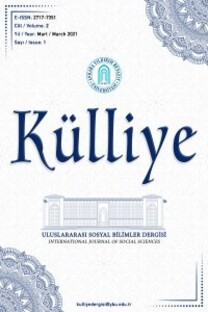Orhan Pamuk’un Kar ve Cevdet Bey ve Oğulları Romanlarının Oryantalist Bir Analizi
Bu çalışma Orhan Pamuk’un Kar ile Cevdet Bey ve Oğulları adlı iki romanında Oryantalizm’in izlerini incelenmektedir. Teorik çerçeve olarak, Oryantalizm, Batılı bilim insanlarının Doğu ülkelerine hakimiyet kurmak amacıyla uyguladıkları edebi çalışmalara atıf yaparak “ben” ve “öteki” ayrımına odaklanmaktadır. “Benlik” sürekli olarak “ötekini” doğuştan farklı olarak damgalıyor ve ötekileştiriyor. Bu süreç, Batı ve Doğu sınırlarını sıkı bir şekilde çizerek, iki taraf arasında sorunlu bir ilişkinin başlangıç noktası oluyor. Antik çağlardan bu yana Batının Doğu medeniyetleri üzerine düşünme biçimi olarak varlığını korumuştur. Bu bağlamda Orhan Pamuk'un her iki romanında yansıttığı Oryantalist detaylar bu çalışmanın ana konusunu oluşturmaktadır. Çalışmanın amacı Pamuk'un seçilmiş romanlarında Oryantalist söylemin izlerini incelemek ve yazarın kendi toplumunu tasvirine bir yaklaşım getirmektir. Said, Bhabha, Fanon gibi öncü teorisyenlerin ışığında, seçili metinler üzerindeki tartışmalar Doğu-Batı ikililikleri, kültürel kimlik ve çatışmalar gibi temalara dayandırılmaktadır. Tespit edilen Doğu-Batı karşıtlıklarından hareketle çalışma, Türkiye'nin hem kendi içinde hem de Batı medeniyetine karşı nasıl bir Oryantalleşme süreci yaşadığını ortaya koymaktadır.
Anahtar Kelimeler:
Oryantalizm, İslam, Orhan Pamuk, Doğu/Batı, taklit
An Orientalist Analysis of Orhan Pamuk’s Snow and Cevdet Bey and His Sons
The present study analyses the traces of Orientalism in Orhan Pamuk’s two novels Snow and Cevdet Bey and His Sons. As a theoretical framework, Orientalism focuses on the distinction between “the self” and “the other” attributing to the literary studies applied by Western scholars to the Eastern countries for the purpose of establishing dominance. “The self” constantly stigmatizes and marginalizes “the other” as innately different. This process strictly draws on West and East boundaries and becomes the starting point of a problematic relationship between the two sides. Since ancient times, it has preserved its existence as a mode of thinking of the West on Eastern civilizations. In this context, the Orientalist details that Orhan Pamuk reflects on his both novels are the main subjects of this work. The study examines traces of Orientalist discourse in Pamuk’s selected novels and tries to bring an approach to the author’s portrayal of his own society. In the light of the pioneering theorists, like Said, Bhabha, and Fanon, the arguments on selected texts are grounded on the themes such as the East-West binaries, cultural identity, and conflicts. Based on the East-West contrasts identified, the study reveals what kind of an Orientalization process Türkiye went through both within itself and against the Western civilization.
Keywords:
Orientalism, Islam, Orhan Pamuk, East/West, mimicry,
___
- Ayan, E. (2019). Edward W. Said’in Oryantalizm kuramından hareketle Orhan Pamuk’un anlatıları üzerine bir inceleme. Yeni Türk Edebiyatı Araştırmaları, 21, 38-59.
- Bhabha, H. K. (1990). Narrating the nation. In H. K. Bhabha (Ed.), Nation and narration (pp. 1-7). Routledge.
- Bhabha, H. K. (1994). The location of culture. Routledge.
- Bhabha, H. K. (1996). Culture’s in-between. In S. Hall, P. D. Gay (Eds.), Questions of cultural identity (pp. 53-60). Sage.
- Bhabha, H. K. (2008). Foreword to the 1986 Edition. In F. Fanon (Ed.), Black Skin, White Masks (pp. Xxi-xxxvii). Pluto.
- Buruma, I, & Margalit, A. (2004). Occidentalism: The West in the eyes of its enemies. Penguin.
- Fanon, F. (2008). Black skin, white masks. (C. L. Markmann, Trans.). Pluto. (Original work published 1952)
- Ferguson, N. (2012). Civilization: The West and the rest. Penguin.
- Furlanetto, E. (2014). “Safe spaces of the like-minded”: The search for a hybrid post-Ottoman identity in Elif Shafak’s The Bastard of Istanbul. Commonwealth Essays and Studies, 36(2), 19-31.
- Furlanetto, E. (2018). Disintegrated Selves: Dissociative Disorders and Colonial Anxiety in Orhan Pamuk’s “The Black Book.” In E. Furlanetto and D. Meinel (Eds.), A Poetics of eurosis: Narratives of Normalcy and Disorder in Cultural and Literary Texts, (pp. 55-74). Transcript Verlag.
- Göknar, E. (2006). Orhan Pamuk and the Ottoman theme. World Literature Today. 80(6), 34-38.
- Göknar, E. (2006a). Beyaz Kale’de özdeşleşme politikası. In E. Kılıç (Ed.), Orhan Pamuk’u anlamak (pp. 115-131). İletişim.
- Göknar, E. (2006b). Yeni hayat ve Türk milliyetçiliğinin eleştirisi. In E. Kılıç (Ed.), Orhan Pamuk’u anlamak (pp. 325-337). İletişim.
- Göknar, E. (2012). Secular blasphemies: Orhan Pamuk and the Turkish novel. The contemporary novel: Imagining the twenty-first century. 45(2), 301-326.
- Hentsch, T. (2008). Imagining the Middle East. Chicago University Press.
- Levi-Strauss, C. (2010), Race and history. Unesco Publishing.
- Mattar, K. (2014). Orhan Pamuk and the limits of translation: Foreignizing “The Black Book” for world literature. Translation and literature, 23(1), 42-6.
- Pamuk, O. (2011). Interview by Angel Gurria-Quintana. The Paris Review. (Accessed 23 August 2023).
- Pamuk, O. (2013a). Cevdet Bey and his sons. Yapı Kredi Publishing.
- Pamuk, O. (2013b). Snow. Yapı Kredi Publishing.
- Said, E. (1994). Culture and imperialism. Vintage.
- Said, E. (1997). Covering Islam: How the media and the experts determine how we see the rest of the world. Knopf.
- Said, E. (1999). Out of place. Vintage.
- Said, E. (2003). Orientalism. Vintage.
- Yayın Aralığı: Yılda 2 Sayı
- Başlangıç: 2020
- Yayıncı: Sıddık Çalık
Sayıdaki Diğer Makaleler
Hârezm’in Gazneliler Tarafından İşgali ve Me’mûnî Devletinin Yıkılışı
Masallarda Padişah-Şehzade Çatışmasının Psikanalitik Yönü
Orhan Pamuk’un Kar ve Cevdet Bey ve Oğulları Romanlarının Oryantalist Bir Analizi
Ağrı İli Tunç Çağı Mezarlarının Sınıflandırılması ve Değerlendirilmesi
Somut Olmayan Kültürel Miras Bağlamında Yaşa(ma)yan İnsan Hazinesi Olarak Âşık Veysel
İbrahim Ethem ARIOĞLU, Özlem AYDOĞDU ATASOY
Muad Khaled Salem BABATTAH, Vildan ATEŞ
Aristoteles'in Sorgulanan Tanıklığı: Felsefenin Başlangıcı ve Materyal Monizm Kuramı
